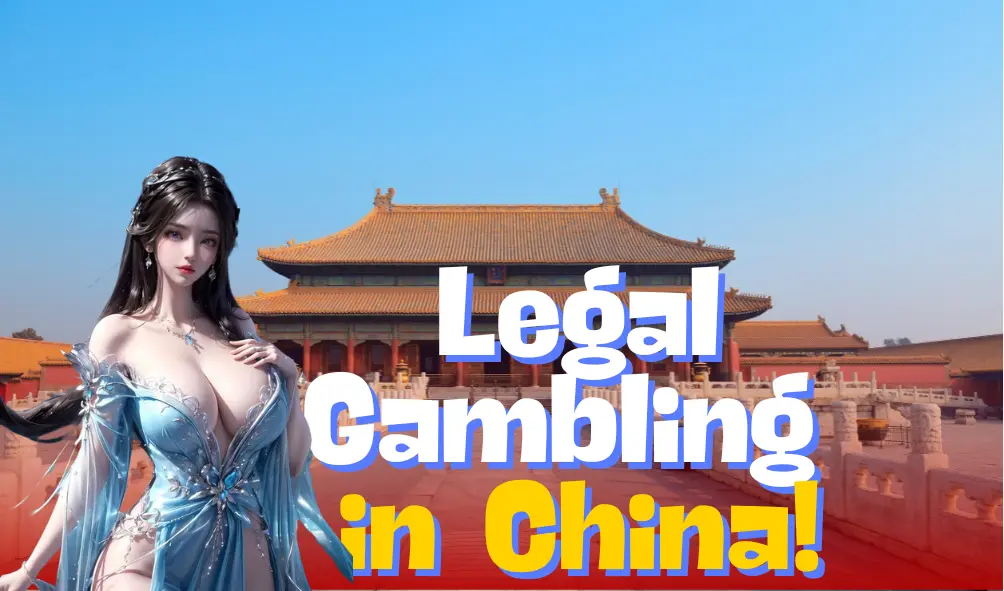Legal Gambling in China
China has a complex and evolving relationship with gambling as the country navigates the balance between traditional cultural practices and the modern realities of the global gambling industry. At the same time, particular forms of gambling have been present in Chinese society for centuries. The legal and regulatory framework governing gambling has changed significantly in recent decades.

Historical Context
Traditional Forms of Gambling in Chinese Culture
Gambling has long been a part of Chinese culture, with ancient roots tracing back thousands of years—traditional forms of gambling, such as Chinese chess and mahjong. And various card games have been deeply ingrained in China’s social fabric. These games were not only a source of entertainment but also often served as a means of social interaction and cultural expression.
The Evolution of Legal Gambling in Modern China
The modern history of legal gambling in China can be divided into several phases. In the early 20th century, the Nationalist government was under the leadership of Sun Yat-sen. It made efforts to regulate and control gambling activities. It recognizes both the potential economic benefits and the social risks associated with the industry.
During the Communist era, under the rule of Mao Zedong. Gambling was prohibited mainly and viewed as a capitalist vice incompatible with the socialist ideology.
The Rise of Macau as a Gambling Powerhouse
The most significant development in the history of legal gambling in China was the emergence of Macau as a global gambling hub. Formerly a Portuguese colony. Macau was returned to Chinese sovereignty in 1999 and has become the world’s largest gambling market. Surpassing even Las Vegas. The liberalization of Macau’s gambling industry, coupled with its unique political and economic status. It has transformed the region into a significant center for legal gambling in China.
Regulatory Framework
The Legal Basis for Gambling in China
The legal foundation for gambling in China is primarily based on the Criminal Law of the People’s Republic of China. Which prohibits the operation of unlicensed gambling activities. However, the law also recognizes certain forms of legal gambling, such as the state-run lottery and sports betting.
Governing Agencies and Regulatory Oversight
The regulation of the gambling industry in China is overseen by several government agencies, each with specific responsibilities. The Ministry of Finance manages the state-run lottery, while the General Administration of Sport oversees sports betting.
The purview of the Ministry of Public Security is regulating casinos and other forms of legal gambling. Which issues licenses and enforces compliance with relevant laws and regulations. The Macau Special Administrative Region government also maintains its regulatory framework for the gambling industry within its jurisdiction.
The Licensing Process for Gambling Operators
The process of obtaining a gambling license in China differs depending on the type of gambling activity. The Ministry of Finance grants licenses to authorized operators for the state-run lottery. Regarding sports betting, the General Administration of Sport is responsible for issuing licenses to eligible providers.
For casinos and other land-based gambling operations. The licensing process is more complex, particularly in the case of Macau. Operators must undergo a rigorous vetting process and meet stringent financial stability and corporate governance requirements. And compliance with anti-money laundering regulations.
Types of Legal Gambling
Land-Based Casinos
The most prominent form of legal gambling in China is the casino industry, which is primarily concentrated in the Macau Special Administrative Region. Macau’s casinos offer various gaming options. Including table games, slot machines, and specialty games.
In recent years, the Chinese government has also approved the establishment of integrated resort projects in other regions. Such as Hainan Island, to diversify the legal gambling landscape and promote tourism.
Online Gambling
The online gambling market in China is a complex and evolving landscape. While the government has generally maintained a strict stance against online gambling, a few exceptions have been made. Such as the legalization of online sports betting and certain forms of online lottery.
However, the regulatory environment for online gambling remains challenging, with the government actively monitoring and cracking down on unauthorized offshore operators targeting Chinese consumers.
Sports Betting
About Sports betting is one of the more regulated forms of legal gambling in China, with the state-run sports lottery serving as the primary legal channel. The General Administration of Sport oversees the sports betting industry. Then, licenses will be issued to authorized operators to ensure compliance with relevant laws and regulations.
Lottery
The state-run lottery system is China’s most widely accepted form of legal gambling. The Ministry of Finance regulates the lottery industry and includes various games, such as the traditional welfare lottery and the newer sports lottery.
The lottery market in China has experienced substantial growth in recent years, driven by the government’s efforts to expand the industry and generate revenue for social welfare programs.
Impact on Society and Economy
Economic Contributions of the Gambling Industry
The gambling industry has significantly contributed to China’s economy, particularly in Macau. The revenue generated by Macau’s casinos has played a vital role in the city’s economic development, creating thousands of jobs and supporting various ancillary industries.
Moreover, the tax revenue from the gambling industry has been a valuable source of funding for the government, enabling investments in infrastructure, social welfare, and other public services.
Social Implications and Responsible Gambling Measures
The growth of the legal gambling industry in China has also brought about social concerns, particularly regarding problem gambling and its associated societal impacts. To address these issues, the government has implemented various responsible gambling measures, such as:
- Establishing problem gambling treatment and counseling services
- Implementing age restrictions and self-exclusion programs
- Introducing regulations to limit the number of gambling venues and gaming tables
- Promoting public education campaigns on the risks of problem gambling
These efforts strive to balance the economic benefits of the gambling industry and the need to mitigate the potential social costs.
Employment Opportunities and Workforce Development
The gambling industry has become a significant employer in China, particularly in regions like Macau. Developing integrated resorts and casinos has created various job opportunities, from gaming operations and hospitality to ancillary services and support functions.
Moreover, the gambling industry has contributed to developing specialized skills and expertise. It is so, focusing on training and upskilling the local workforce to meet the industry’s demands.
Responsible Gambling Measures
Gambling Addiction Treatment and Counseling
In response to the growing concerns over problem gambling, the Chinese government has invested in the establishment of gambling addiction treatment and counseling services. These programs deliver support and resources for individuals struggling with gambling addiction. Providing access to specialized therapists, support groups, and rehabilitation services.
Regulatory Measures to Promote Responsible Gambling
The regulatory framework governing the gambling industry in China also includes measures aimed at promoting responsible gambling practices. These include:
- Age Restrictions: The legal gambling age in China is generally set at 21 years old, with strict enforcement measures in place to prevent underage gambling.
- Self-Exclusion Programs: Gambling operators must implement self-exclusion programs, allowing individuals to voluntarily exclude themselves from gambling activities for a specified period.
- Limits on Gaming Operations: The government has imposed limits on the number of gambling venues and gaming tables and restrictions on the operating hours of casinos to mitigate the potential for excessive gambling.
Collaboration Between Operators and Regulators
The success of responsible gambling measures in China relies on the collaborative efforts of gambling operators and regulatory authorities. Operators must implement responsible gambling initiatives. Such as providing information on problem gambling and access to support services, while regulators closely monitor compliance and enforce relevant regulations.
Conclusion
Finally, The legal gambling landscape in China has undergone a significant transformation in recent decades, reflecting the country’s evolving approach to this complex and multifaceted industry. The emergence of Macau as a global gambling hub. The expansion of legal gambling into other regions and the ongoing efforts to balance the economic benefits with the potential social costs have all contributed to the dynamic nature of the legal gambling industry in China.
As the government continues to refine the regulatory framework and address the challenges posed by problem gambling. The future of legal gambling in China will likely involve a fragile balance between fostering economic growth and preserving cultural traditions. And ensuring the population’s well-being. Then, The success of this work will be crucial in shaping the long-term trajectory of the legal gambling industry in China.










